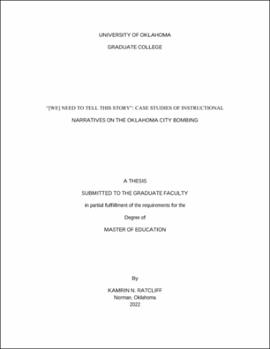| dc.description.abstract | Teachers intentionally and unintentionally present particular interpretations and narratives of historical events; these narratives shape students' understanding and perceptions of the past, present, and future. Through a multiple case-study methodology, this study seeks to answer the following research question, What historical narratives are Oklahoma social studies teachers presenting on the Oklahoma City Bombing?. I collected data from three Oklahoma History teachers, including semi-structured interviews, observations of the lessons on the OKC Bombing, and content-analysis of the materials used throughout instruction. This data was analyzed and triangulated to help make valid and reliable interpretations of the presented narratives. The three teachers, Jean-Pierre, Katie, Adriana, approached this subject/topic in different ways. The various instructional narratives on the OKC Bombing include a disparate collection of concepts and events associated with the OKC Bombing; a sequence of events that led Timothy McVeigh to become the OKC Bomber; and a timeline of events proceeding and following the bombing. These narratives do not critically consider or discuss deeply rooted concepts such as the white power movement and white supremacy: both of which served as contextual and motivating factors surrounding April 19th, 1995. With limited discussion of these topics, which are central to understanding the broader historical context and legacy of the OKC Bombing, students will leave with a superficial, incomplete understanding of the event. More broadly, acts of domestic terrorism perpetrated by radicalized white nationalists like McVeigh are on the rise and must be critically examined. This examination, situated in conversations about white supremacy and the white power movement, helps us name and understand the danger these ideologies pose and perpetuate. Critically deconstructing the root causes of events like the OKC Bombing help prevent similar events, like those seen during the January 6th, 2021, insurrection of the United States Capitol, from happening again. | en_US |
